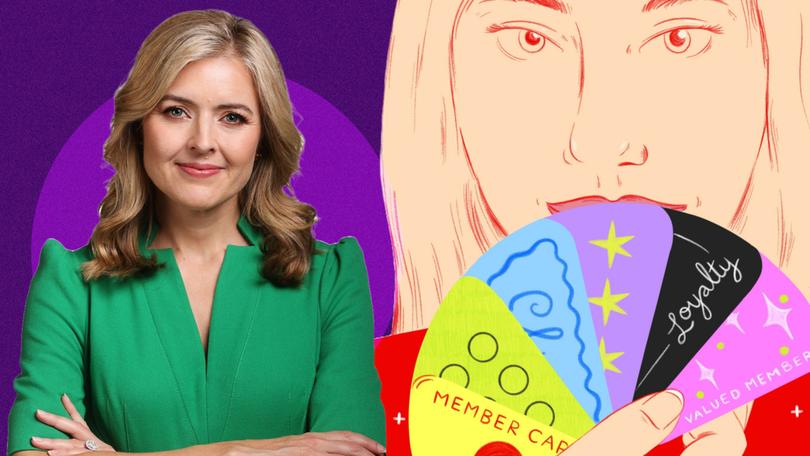GEMMA ACTON: We all love a freebie but rewards programs rarely pay
GEMMA ACTON: We can blame our reptilian brains for the near-universal tendency to be seduced by the offer of a freebie.

It took my leather cardholder falling apart under the strain of adding yet another card to the growing stack to realise that I really didn’t need to belong to so many loyalty programs.
That final card that broke the proverbial camel’s back was for a pharmacy I frequent perhaps twice a year. In other words, absolutely no benefit to me joining its members’ scheme.
Sure, it was “free” to join but the concept of “free” requires some caveats when we glibly hand over reams of personal data to businesses that hoard it, analyse it, sell it and most concerningly of all, combine it with other data to learn even more about us.
Sign up to The Nightly's newsletters.
Get the first look at the digital newspaper, curated daily stories and breaking headlines delivered to your inbox.
By continuing you agree to our Terms and Privacy Policy.As Tristan Harris infamously said, “If you’re not paying for the product, then you’re the product.”
Today, Harris heads up the non-profit Center for Humane Technology and that, combined with his former role as a design ethicist for Google, gives him credibility in any conversation about the leeching away of our extremely valuable asset — personal data — by giant companies.
We might not be paying to use search engines or social media in dollar terms but it’s certainly not free — rather a very poor value contra trade for the average consumer (and that’s before we stop to consider the mental health sacrifices).
As we’re aware, that data we’re giving away for free is being spun into billions of dollars worth of gold for major technology companies, as we allow ourselves to be manipulated by their precisely honed algorithms.
Allowing these data behemoths such power over us is what Harris disturbingly refers to as the “race to the bottom of the brain stem”.
Loyalty schemes are big business. It’s estimated that 95 per cent of Australians belong to at least one loyalty program with more than two in three belonging to Woolworths’ Everyday Rewards and Coles’ Flybuys programs. Do we save money through them? The jury is out.

Sure, we get access to special offers, discounts and we can cash in our points for prizes or savings.
Getting $10 off a grocery shop after spending $2000 isn’t particularly compelling yet it’s enough to hook the vast majority of Australians given this is the basic rewards rate for both Everyday Rewards and Flybuys.
And does it even wash its face once we add in the reality that we often overspend or buy things we ordinarily wouldn’t so we can seize some extra points?
Or the admission found in countless surveys that belonging to a loyalty scheme discourages us from shopping around for a better price as we’re blindly focused on amassing more points? Probably not.
Last week the ACCC published the eighth instalment in its series examining how our information is collected and used by data firms in Australia.
This latest 135-page update concluded by saying the report provides “further evidence to support the introduction of a prohibition on unfair trading practices and the implementation of strengthened privacy laws in Australia”.
Yes, nothing is taken from us without our consent.
We hastily sign away our legal protections, short on time and eager to lock in access to the meagre rewards on offer, stuck in the psychological trap of believing we’re getting something for nothing.
But the ACCC report also states that it takes a consumer 29 minutes to read a typical privacy policy attached to a product or service in Australia.
If we read in full every one that we came across each month, the consumer watchdog estimates that’d take a whopping 46 hours — in other words, nearly two full days and nights every single month.
We can blame our reptilian brains for the near-universal tendency to be seduced by the offer of a freebie.
Not only does getting something for free immediately trigger a dopamine rush that makes us feel good — but it also instils in us a sense that we owe something in return.
The clue of what we give is in the name — loyalty programs. Just remember that this refers to your loyalty to the business, not vice versa.
Back in 2019, the ACCC decided that the major Australian loyalty schemes benefited from significant information asymmetries between them and consumers.
Five years on, we can only expect the problem to have got worse given our legal protections have failed to keep pace with the mind-bendingly fast developments in technology and data collection and processing.
I always enjoy hearing from the loyalty experts and points hackers who are able to make these programs really work for them, flying business class around the world and staying in the finest hotels for free.
But it is such a mammoth undertaking to stay on top of these complicated and caveat-ridden schemes that it is literally a full time job for them, not something the vast majority of us have time to game.
I still utilise a few loyalty schemes and am just as prone to reacting with delight when I pocket a reward that appears “free” — as I’ve forgotten the many months’ slog I’ve undergone, dutifully spending at the same place, to rack up the necessary number of points.
But I am trying to be far more mindful of the trade terms of what I’m getting and what I’m giving up each time I’m invited to join a loyalty scheme.

